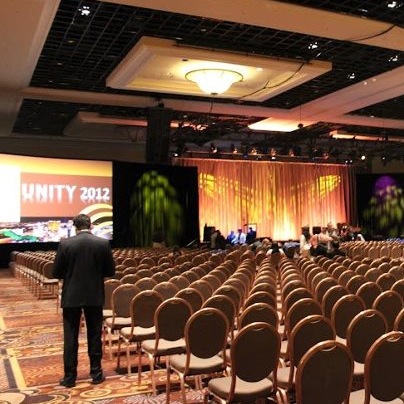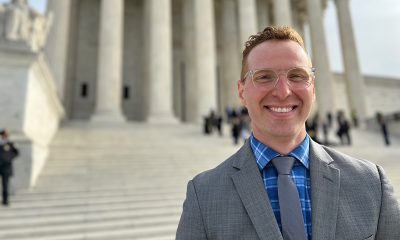National
Is reconciliation possible for minority journalist convention?
After black journalist group quits coalition, and gay journalist group joins, accusations of homophobia may mar chances of true ‘unity.’


The National Gay and Lesbian Journalists Association contended with much controversy in its first year participating in the quadrennial minority journalist convention, UNITY. (Photo by Matthew Mullins)
Though the largest regular gathering of journalists in the nation included LGBT members for the first time, the coalition for minority journalists known as UNITY may be heading toward demise.
As first reported by the Maynard Institute, UNITY executive director Onica Makwakwa says the conference attracted 2,000 attendees this year, far below the 7,550 journalists who saw then Democratic Presidential candidate Barack Obama address the Chicago gathering. According to the Maynard Institute, Unity attracted 2,385 attendees. Much of that decline can be attributed to the absence of founding organization, the National Association of Black Journalists, which pulled out of the coalition after 18 years in 2011 citing disputes over the division of finances, and held its own New Orleans conference attracting 2,386 in June.
Though NLGJA was only invited to the coalition after the NABJ departure, a ‘black vs. gay’ narrative has been explored in some of the most recent coverage of the split. After NLGJA was invited into UNITY late last year, the organization successfully lobbied the coalition to change its name from UNITY: Journalists of Color, Inc. to solely UNITY Journalists, generating criticism from some NABJ members, including the organization’s president Gregory Lee, according to the Village Voice.
According to the Voice, NABJ has long been accused of opposing NLGJA’s membership in the coalition, which has been voted on several times by the UNITY board over the past decade and a half. However, Lee flatly denies the accusation of homophobia driving the split — citing his group’s LGBT task force, a first among minority journalist groups — and tells the Voice’s Steven Thrasher that after being forced to lay off staff, the coalition’s largest member — contributing more than half of the attendees in 2008 — was opposed to the financial split that saw NABJ receive a mere 35 percent return on profits.
However, Lee accuses NLGJA of lacking diversity in its leadership, which NLGJA leaders claim is a driving factor behind the organization’s desire to be part of the UNITY coalition. Attract black, Hispanic, Asian and Native American LGBT journalists to the organization, as well as share in the common experience of being part of an underrepresented community in the newsroom, can benefit all attendees of the quadrennial conference, according to NLGJA members.
“I know the perception among some folks of color is that NLGJA is an organization run by a bunch of white guys,” Michelle Johnson of Boston University, and a member of both NABJ and NLGJA told the New York Times. “There are white guys that are in the organization who have also faced discrimination in the newsroom.”
Ken Miguel — segment producer at ABC affiliate KGO-TV in San Francisco and a National Board member of NLGJA — could not speak to the Blade officially for the Board, but said personally he was disappointed with what he perceived as a missed opportunity for the National Association of Black Journalists to meet and get to know LGBT journalists at the Unity Conference.
“If they wanted to show this was not about homophobia and race then they should have made an effort to be at [the NLGJA] events, and to get face time, and to shake hands with NLGJA journalists and let us know this is not about us,” Miguel said, saying that while Lee, and many other NABJ leaders were in attendance August 1 – 4 in Las Vegas, he felt they stayed away from LGBT-related panels and events. “I was on some panels where it was absolutely fantastic where [Native American Journalist Association] and [Asian American Journalist Association] and [National Association of Hispanic Journalists] members who were not gay were asking the right questions about what should they be covering.”
In the conference’s opening session hosted by CNN Worldwide executive vice president and managing editor, Mark Whittaker, ESPN writer and NABJ, NLGJA member LZ Granderson continued to take NABJ to task regarding its reluctance to rejoin the UNITY coalition following the name change.
“Homophobia has played a role in this tension, race has certainly played a role in this tension, money has played a role in this tension,” Granderson said. “And ALL of those things need to be talked about and hashed and on the table, not just the ones that are P.C.”
“You want to talk historically is there homophobia within [NABJ]? Yes,” KGO-TV’s Miguel told the Blade. “But do you want to say NABJ was the only group that voted that way? I know people who were members of the board then who told me, when we were discussing whether or not we should join Unity, that they were not the only ones that voted that way.”
Other longstanding members of NLGJA that attended the conference were skeptical about the need for the LGBT journalist group to continue to partner with UNITY.
“In the end, it seemed like being part of the Unity convention was more about what was good for NLGJA as an organization and less about its members,” lamented former NLGJA conference co-chair Fred Kuhr, who now edits the LGBT media trade publication, Press Pass Q, and says that the lack of programming integration between the four associations was disappointing.
The UNITY board was not the only entity to face pressures over inclusion in its name at this year’s conference. During a Thursday members meeting, several NLGJA members expressed disappointment the organization’s name excludes bisexual and trans members. Outgoing board president, David Steinberg and NLGJA executive director Michael Tune both assured the members gathered that concerns would be taken seriously and that the organization would consider evaluating the problem. This reporter was one of the members present who spoke out in favor of a name change during that discussion.
During that meeting, NLGJA members were also introduced to the organization’s new board President, Washington D.C. native, Michael Triplett, who is an assistant managing editor at Bloomberg-BNA and has served long on the board. Triplett said few words as he was recovering from laryngitis, but expressed a desire for members to come to him with ideas and concerns.
Though LGBT attendees of the conference disagreed over future participation, most agreed that the conference was an overall positive experience.
“Its no secret that I was the voice of doubt [on the Board] that this was going to work,” said Miguel. “do I think that it’s been beneficial for the organization? Yes, my eyes have been opened. I hope that the other minority journalists that did attend, their eyes were opened too, and I get a sense that that was the case.”
Both NABJ’s Lee and former NABJ President and co-founder of UNITY Will Sutton expressed hope that a reconciliation could occur between the group and UNITY, a sentiment echoed throughout the weekend by leaders from NAJA, NAHJ and AAJA, the other three founding members of the coalition. However, Lee implied that a condition of rejoining would be for members to vote on NLGJA’s continued participation in UNITY, despite the organization’s full participation this year.
“Since NABJ chose to pull out of UNITY, why is it even making a stink and making statements about UNITY now?” Kuhr — who has attended all but one NLGJA national conference since 1994 — told the Blade. “If they want to work to make UNITY better, then rejoin. If not, then stop making trouble from the sidelines. This kind of political back-and-forth is not helpful to UNITY and its other member organizations. If this squabbling can’t be tamped down, then it’s one more reason for NLGJA not to remain in UNITY.”
Phil Reese is a member of the National Lesbian and Gay Journalist Association and a member of the local D.C. chapter board.
Federal Government
Treasury Department has a gay secretary but LGBTQ staff are under siege
Agency reverses course on LGBTQ inclusion under out Secretary Scott Bessent

A former Treasury Department employee who led the agency’s LGBTQ employee resource group says the removal of sexual orientation and gender identity (SOGI) from its discrimination complaint forms was merely a formalization of existing policy shifts that had already taken hold following the second inauguration of President Donald Trump and his appointment of Scott Bessent — who is gay — to lead the agency.
Christen Boas Hayes, who served on the policy team at Treasury’s Financial Crimes Enforcement Network (FinCEN) from 2020 until March of this year, told the Washington Blade during a phone interview last week that the agency had already stopped processing internal Equal Employment Opportunity (EEO) complaints on the basis of anti-LGBTQ discrimination.
“So the way that the forms are changing is a procedural recognition of something that’s already happening,” said Hayes. “Internally, from speaking to two EEO staff members, the changes are already taking place from an EEO perspective on what kind of cases will be found to have the basis for a complaint.”
The move, they said, comes amid the deterioration of support structures for LGBTQ workers at the agency since the administration’s early rollout of anti-LGBTQ executive orders, which led to “a trickle down effect of how each agency implements those and on what timeline,” decisions “typically made by the assistant secretary of management’s office and then implemented by the appropriate offices.”
At the end of June, a group of U.S. House Democrats including several out LGBTQ members raised alarms after a Federal Register notice disclosed Treasury’s plans to revise its complaint procedures. Through the agency’s Office of Civil Rights and EEO, the agency would eliminate SOGI as protected categories on the forms used by employees to initiate claims of workplace discrimination.
But Hayes’s account reveals that the paperwork change followed months of internal practice, pursuant to a wave of layoffs targeting DEI personnel and a chilling effect on LGBTQ organizing, including through ERGs.
Hayes joined Treasury’s FinCEN in 2020 as the agency transitioned into the Biden-Harris administration, working primarily on cryptocurrency regulation and emerging technologies until they accepted a “deferred resignation” offer, which was extended to civil servants this year amid drastic staffing cuts.
“It was two things,” Hayes said. “One was the fact that the policy work that I was very excited about doing was going to change in nature significantly. The second part was that the environment for LGBTQ staff members was increasingly negative after the release of the executive orders,” especially for trans and nonbinary or gender diverse employees.
“At the same time,” Hayes added, “having been on the job for four years, I also knew this year was the year that I would leave Treasury. I was a good candidate for [deferred resignation], because I was already planning on leaving, but the pressures that emerged following the change in administration really pushed me to accelerate that timeline.”
Some ERGs die by formal edict, others by a thousand cuts
Hayes became involved with the Treasury LGBTQ ERG shortly after joining the agency in 2020, when they reached out to the group’s then-president — “who also recently took the deferred resignation.”
“She said that because of the pressure that ERGs had faced under the first Trump administration, the group was rebuilding, and I became the president of the group pretty quickly,” Hayes said. “Those pressures have increased in the second Trump administration.”
One of the previous ERG board members had left the agency after encountering what Hayes described as “explicitly transphobic” treatment from supervisors during his gender transition. “His supervisors denied him a promotion,” and, “importantly, he did not have faith in the EEO complaint process” to see the issues with discrimination resolved, Hayes said. “And so he decided to just leave, which was, of course, such a loss for Treasury and our Employee Resource Group and all of our employees at Treasury.”
The umbrella LGBTQ ERG that Hayes led included hundreds of members across the agency, they said, and was complemented by smaller ERGs at sub-agencies like the IRS and FinCEN — several of which, Hayes said, were explicitly told to cease operations under the new administration.
Hayes did not receive any formal directive to shutter Treasury’s ERG, but described an “implicit” messaging campaign meant to shut down the group’s activities without issuing anything in writing.
“The suggestion was to stop emailing about anything related to the employee resource group, to have meetings outside of work hours, to meet off of Treasury’s campus, and things like that,” they said. “So obviously that contributes to essentially not existing functionally. Because whereas we could have previously emailed our members comfortably to announce a happy hour or a training or something like that, now they have to text each other personally to gather, which essentially makes it a defunct group.”
Internal directories scrubbed, gender-neutral restrooms removed
Hayes said the dismantling of DEI staff began almost immediately after the executive orders. Employees whose position descriptions included the terms “diversity, equity, and inclusion” were “on the chopping block,” they said. “That may differ from more statutorily mandated positions in the OMWI office or the EEO office.”
With those staff gone, so went the infrastructure that enabled ERG programming and community-building. “The people that made our employee resource group events possible were DEI staff that were fired. And so, it created an immediate chilling effect on our employee resource group, and it also, of course, put fear into a lot of our members’ hearts over whether or not we would be able to continue gathering as a community or supporting employees in a more practical way going forward. And it was just, really — it was really sad.”
Hayes described efforts to erase the ERGs from internal communication channels and databases. “They also took our information off internal websites so nobody could find us as lawyers went through the agency’s internal systems to scrub DEI language and programs,” they said.
Within a week, Hayes said, the administration had removed gender-neutral restrooms from Main Treasury, removed third-gender markers from internal databases and forms, and made it more difficult for employees with nonbinary IDs to access government buildings.
“[They] made it challenging for people with X gender markers on identification documents to access Treasury or the White House by not recognizing their gender marker on the TWAVES and WAVES forms.”
LGBTQ staff lack support and work amid a climate of isolation
The changes have left many LGBTQ staff feeling vulnerable — not only because of diminished workplace inclusion, but due to concerns about job security amid the administration’s reductions in force (RIFs).
“Plenty of people are feeling very stressed, not only about retaining their jobs because of the layoffs and pending questions around RIFs, but then also wondering if they will be included in RIF lists because they’re being penalized somehow for being out at work,” Hayes said. “People wonder if their name will be given, not because they’re in a tranche of billets being laid off, but because of their gender identity or sexual orientation.”
In the absence of functional ERGs, Hayes said, LGBTQ employees have been cut off from even informal networks of support.
“Employees [are] feeling like it’s harder to find members of their own community because there’s no email anymore to ask when the next event is or to ask about navigating healthcare or other questions,” they said. “If there is no ERG to go to to ask for support for their specific issue, that contributes to isolation, which contributes to a worse work environment.”
Hayes said they had not interacted directly with Secretary Bessent, but they and others observed a shift from the previous administration. “It is stark to see that our first ‘out’ secretary did not host a Pride event this year,” they said. “For the last three years we’ve flown the rainbow Pride flag above Treasury during Pride. And it was such a celebration among staff and Secretary Yellen and the executive secretary’s office were super supportive.”
“Employees notice changes like that,” they added. “Things like the fact that the Secretary’s official bio says ‘spouse’ instead of ‘husband.’ It makes employees wonder if they too should be fearful of being their full selves at work.”
The Blade contacted the Treasury Department with a request for comment outlining Hayes’s allegations, including the removal of inclusive infrastructure, the discouragement of ERG activity, the pre-formalization of EEO policy changes, and the targeting of DEI personnel. As of publication, the agency has not responded.
U.S. Supreme Court
Supreme Court to consider bans on trans athletes in school sports
27 states have passed laws limiting participation in athletics programs

The U.S. Supreme Court on Thursday agreed to hear two cases involving transgender youth challenging bans prohibiting them from participating in school sports.
In Little v. Hecox, plaintiffs represented by the ACLU, Legal Voice, and the law firm Cooley are challenging Idaho’s 2020 ban, which requires sex testing to adjudicate questions of an athlete’s eligibility.
The 9th U.S. Circuit Court of Appeals described the process in a 2023 decision halting the policy’s enforcement pending an outcome in the litigation. The “sex dispute verification process, whereby any individual can ‘dispute’ the sex of any female student athlete in the state of Idaho,” the court wrote, would “require her to undergo intrusive medical procedures to verify her sex, including gynecological exams.”
In West Virginia v. B.P.J., Lambda Legal, the ACLU, the ACLU of West Virginia, and Cooley are representing a trans middle school student challenging the Mountain State’s 2021 ban on trans athletes.
The plaintiff was participating in cross country when the law was passed, taking puberty blockers that would have significantly reduced the chances that she could have a physiological advantage over cisgender peers.
“Like any other educational program, school athletic programs should be accessible for everyone regardless of their sex or transgender status,” said Joshua Block, senior counsel for the ACLU’s LGBTQ and HIV Project. “Trans kids play sports for the same reasons their peers do — to learn perseverance, dedication, teamwork, and to simply have fun with their friends,” Block said.
He added, “Categorically excluding kids from school sports just because they are transgender will only make our schools less safe and more hurtful places for all youth. We believe the lower courts were right to block these discriminatory laws, and we will continue to defend the freedom of all kids to play.”
“Our client just wants to play sports with her friends and peers,” said Lambda Legal Senior Counsel Tara Borelli. “Everyone understands the value of participating in team athletics, for fitness, leadership, socialization, and myriad other benefits.”
Borelli continued, “The U.S. Court of Appeals for the Fourth Circuit last April issued a thoughtful and thorough ruling allowing B.P.J. to continue participating in track events. That well-reasoned decision should stand the test of time, and we stand ready to defend it.”
Shortly after taking control of both legislative chambers, Republican members of Congress tried — unsuccessfully — to pass a national ban like those now enforced in 27 states since 2020.
Federal Government
UPenn erases Lia Thomas’s records as part of settlement with White House
University agreed to ban trans women from women’s sports teams

In a settlement with the Trump-Vance administration announced on Tuesday, the University of Pennsylvania will ban transgender athletes from competing and erase swimming records set by transgender former student Lia Thomas.
The U.S. Department of Education’s Office for Civil Rights found the university in violation of Title IX, the federal rights law barring sex based discrimination in educational institutions, by “permitting males to compete in women’s intercollegiate athletics and to occupy women-only intimate facilities.”
The statement issued by University of Pennsylvania President J. Larry Jameson highlighted how the law’s interpretation was changed substantially under President Donald Trump’s second term.
“The Department of Education OCR investigated the participation of one transgender athlete on the women’s swimming team three years ago, during the 2021-2022 swim season,” he wrote. “At that time, Penn was in compliance with NCAA eligibility rules and Title IX as then interpreted.”
Jameson continued, “Penn has always followed — and continues to follow — Title IX and the applicable policy of the NCAA regarding transgender athletes. NCAA eligibility rules changed in February 2025 with Executive Orders 14168 and 14201 and Penn will continue to adhere to these new rules.”
Writing that “we acknowledge that some student-athletes were disadvantaged by these rules” in place while Thomas was allowed to compete, the university president added, “We recognize this and will apologize to those who experienced a competitive disadvantage or experienced anxiety because of the policies in effect at the time.”
“Today’s resolution agreement with UPenn is yet another example of the Trump effect in action,” Education Secretary Linda McMahon said in a statement. “Thanks to the leadership of President Trump, UPenn has agreed both to apologize for its past Title IX violations and to ensure that women’s sports are protected at the university for future generations of female athletes.”
Under former President Joe Biden, the department’s Office of Civil Rights sought to protect against anti-LGBTQ discrimination in education, bringing investigations and enforcement actions in cases where school officials might, for example, require trans students to use restrooms and facilities consistent with their birth sex or fail to respond to peer harassment over their gender identity.
Much of the legal reasoning behind the Biden-Harris administration’s positions extended from the 2020 U.S. Supreme Court case Bostock v. Clayton County, which found that sex-based discrimination includes that which is based on sexual orientation or gender identity under Title VII rules covering employment practices.
The Trump-Vance administration last week put the state of California on notice that its trans athlete policies were, or once were, in violation of Title IX, which comes amid the ongoing battle with Maine over the same issue.
-

 Federal Government2 days ago
Federal Government2 days agoTreasury Department has a gay secretary but LGBTQ staff are under siege
-

 Virginia2 days ago
Virginia2 days agoDefying trends, new LGBTQ center opens in rural Winchester, Va.
-

 District of Columbia1 day ago
District of Columbia1 day agoGay GOP group hosts Ernst, 3 House members — all of whom oppose Equality Act
-

 Opinions3 days ago
Opinions3 days agoUSAID’s demise: America’s global betrayal of trust with LGBTQ people












